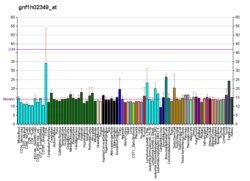MIB1 (gene)
MIB1 marker also used for detection of grades of astrocytoma
E3 ubiquitin-protein ligase MIB1 is an enzyme that in humans is encoded by the MIB1 gene.[5] It is involved in regulating apoptosis.[6]
Confusion with proliferative marker
An antibody directed at the protein Ki-67, a product of the MKI67 gene, is called MIB-1.[7] The MIB1 gene, which regulates apoptosis, should not be confused with the MIB-1 antibody, which is used to measure Ki-67 expression.
References
- 1 2 3 GRCh38: Ensembl release 89: ENSG00000101752 - Ensembl, May 2017
- 1 2 3 GRCm38: Ensembl release 89: ENSMUSG00000024294 - Ensembl, May 2017
- ↑ "Human PubMed Reference:".
- ↑ "Mouse PubMed Reference:".
- ↑ "Entrez Gene: MIB1 mindbomb homolog 1 (Drosophila)".
- ↑ MIB1. OMIM.URL: http://www.ncbi.nlm.nih.gov/entrez/dispomim.cgi?id=608677. Accessed on: April 24, 2009.
- ↑ MIB-1. Veripath OncoDiagnostics. http://www.oncodx.org/onco/mib_1.htm Archived 2006-05-28 at the Wayback Machine.. Accessed on: April 24, 2009.
Further reading
- Nagase T, Kikuno R, Ishikawa KI, et al. (2000). "Prediction of the coding sequences of unidentified human genes. XVI. The complete sequences of 150 new cDNA clones from brain which code for large proteins in vitro.". DNA Res. 7 (1): 65–73. PMID 10718198. doi:10.1093/dnares/7.1.65.
- Wang Z, Tseng CP, Pong RC, et al. (2002). "The mechanism of growth-inhibitory effect of DOC-2/DAB2 in prostate cancer. Characterization of a novel GTPase-activating protein associated with N-terminal domain of DOC-2/DAB2.". J. Biol. Chem. 277 (15): 12622–31. PMID 11812785. doi:10.1074/jbc.M110568200.
- Jin Y, Blue EK, Dixon S, et al. (2003). "A death-associated protein kinase (DAPK)-interacting protein, DIP-1, is an E3 ubiquitin ligase that promotes tumor necrosis factor-induced apoptosis and regulates the cellular levels of DAPK.". J. Biol. Chem. 277 (49): 46980–6. PMC 2824503
 . PMID 12351649. doi:10.1074/jbc.M208585200.
. PMID 12351649. doi:10.1074/jbc.M208585200. - Strausberg RL, Feingold EA, Grouse LH, et al. (2003). "Generation and initial analysis of more than 15,000 full-length human and mouse cDNA sequences.". Proc. Natl. Acad. Sci. U.S.A. 99 (26): 16899–903. PMC 139241
 . PMID 12477932. doi:10.1073/pnas.242603899.
. PMID 12477932. doi:10.1073/pnas.242603899. - Itoh M, Kim CH, Palardy G, et al. (2003). "Mind bomb is a ubiquitin ligase that is essential for efficient activation of Notch signaling by Delta.". Dev. Cell. 4 (1): 67–82. PMID 12530964. doi:10.1016/S1534-5807(02)00409-4.
- Ota T, Suzuki Y, Nishikawa T, et al. (2004). "Complete sequencing and characterization of 21,243 full-length human cDNAs.". Nat. Genet. 36 (1): 40–5. PMID 14702039. doi:10.1038/ng1285.
- Henshall DC, Schindler CK, So NK, et al. (2004). "Death-associated protein kinase expression in human temporal lobe epilepsy.". Ann. Neurol. 55 (4): 485–94. PMID 15048887. doi:10.1002/ana.20001.
- Gerhard DS, Wagner L, Feingold EA, et al. (2004). "The status, quality, and expansion of the NIH full-length cDNA project: the Mammalian Gene Collection (MGC).". Genome Res. 14 (10B): 2121–7. PMC 528928
 . PMID 15489334. doi:10.1101/gr.2596504.
. PMID 15489334. doi:10.1101/gr.2596504. - Yoo KW, Kim EH, Jung SH, et al. (2006). "Snx5, as a Mind bomb-binding protein, is expressed in hematopoietic and endothelial precursor cells in zebrafish.". FEBS Lett. 580 (18): 4409–16. PMID 16857196. doi:10.1016/j.febslet.2006.07.009.
- Song R, Koo BK, Yoon KJ, et al. (2007). "Neuralized-2 regulates a Notch ligand in cooperation with Mind bomb-1.". J. Biol. Chem. 281 (47): 36391–400. PMID 17003037. doi:10.1074/jbc.M606601200.
- Zhang L, Nephew KP, Gallagher PJ (2007). "Regulation of death-associated protein kinase. Stabilization by HSP90 heterocomplexes.". J. Biol. Chem. 282 (16): 11795–804. PMC 2823631
 . PMID 17324930. doi:10.1074/jbc.M610430200.
. PMID 17324930. doi:10.1074/jbc.M610430200. - Yakut T, Gutenberg A, Bekar A, et al. (2007). "Correlation of chromosomal imbalances by comparative genomic hybridization and expression of EGFR, PTEN, p53, and MIB-1 in diffuse gliomas.". Oncol. Rep. 17 (5): 1037–43. PMID 17390041. doi:10.3892/or.17.5.1037.
- van der Avoort IA, van der Laak JA, Paffen A, et al. (2007). "MIB1 expression in basal cell layer: a diagnostic tool to identify premalignancies of the vulva.". Mod. Pathol. 20 (7): 770–8. PMID 17464313. doi:10.1038/modpathol.3800796.
This article is issued from
Wikipedia.
The text is licensed under Creative Commons - Attribution - Sharealike.
Additional terms may apply for the media files.






